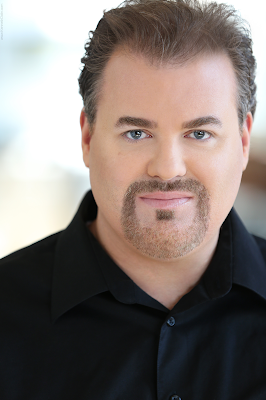I chat to tenor Bruce Sledge as he takes the title role in Meyerbeer's Le prophete at the Deutsche Oper, Berlin.
 |
| Bruce Sledge |
Bruce Sledge, who studied at the University of Southern California and was a finalist in Placido Domingo’s Operalia 2000 competition, has gradually made the transition from high Rossini tenor roles, to the more lower Rossini tenor roles (those written for Andrea Nozzari) to Verdi's lyric tenor roles including the Duke in Rigoletto. That his voice might be continuing on this journey is indicated by his making his role debut as Jean in Meyerbeer's Le prophete at the Deutsche Oper, Berlin [see my review]. I met up with Bruce whilst I was in Berlin to find out more about Le prophete and future plans. This year (2018) Bruce will be singing Bacchus in Richard Strauss' Ariadne auf Naxos with Sante Fe Opera, and Percy in Donizetti's Anna Bolena with Canadian Opera Company, a combination of roles rarely seen in tenors.
 |
| Verdi: Macbeth - Bruce Sledge - Welsh National Opera 2017 (Photo Richard Hubert Smith) |
Coming in as the second cast in a repertory house like the Deutsche Oper, Berlin means that Bruce will have had relatively little stage time before the premiere. But Bruce is a note-taker, noting down all the details of the staging which he feels is useful. Also, his experience covering roles at the Met in New York has helped (though he has also performed roles in his own right there too). On such occasions Bruce is aware that it is up to the singers to create the right mood, whatever the production it is important that the audience be 'blown away by the singing'.
 |
| Rossini: Maometto II - Bruce Sledge Santa Fe Opera 2012 |
Bruce's ability to combine high notes with agility when he was younger meant that he sang a number of high Rossini and Donizetti roles, he comments that if you have the high register than go with it. He feels that his voice had more colour and roundness to it than some tenors who specialise in this repertoire, something that opera companies liked. He has not sung these high tenor roles for ten years, there came a point when he wanted to sing the Duke in Verdi's Rigoletto and found he had to back off performances in roles such as Tonio in Donizetti's La fille du Regiment (with its famous sequence of high C's). Bruce eased himself into the Duk and found his voice developing, it grew and the lower register developed.
And important moment was auditioning for Alberto Zedda at the Rossini Opera Festival in Pesaro in 2004, and instead of the high tenor role in Rossini's Elisabetta Regina d'Inghilterra he was offered the Andrea Nozzari role, Leicester, often described as a bari-tenor role requiring a lower register but still with some high notes and agility. It suited him well, and he also sang Paolo Erisso, the Nozzari role in Rossini's Maometto II with Santa Fe Opera and with Canadian Opera, as well as a number of Donizetti roles.
Bruce emphasises that he simply goes where his voice does, and that this development is taking some interesting turns. He was offered the role of Bacchus in Richard Strauss's Ariadne auf Naxos at Santa Fe Opera in 2018. The role is a notorious dramatic tenor role (albeit a relatively short one); Bruce took a look at it and thought he possible. He studies the role with Marilyn Horne who though it suited his voice well. [The first Bacchus in 1912, Herman Jadlowker, was in fact not strictly a dramatic tenor and was renowned for his coloratura ability and his performances of Rossini and Mozart.]
 |
| Donizetti: Maria Stuarda - Judith Howarth, Bruce Sledge Welsh National Opera 2013 (Photo Robert Workman) |
Bruce's fantasy role would be Calaf in Puccini's Turandot, he thinks that this might be a fun role, and might not be out of the question some day.
Elsewhere on this blog:
- Impressive debuts: Bruce Sledge and Ronnita Miller in Meyerbeer's Le prophete - Opera review
- Full of fantasy: Henning Kraggerud and the Artic Philharmonic Chamber Orchestra in Vivaldi and more - cd review
- New Year's Eve with Arcangelo - concert review
- Review of the year - 2017 in opera and concert reviews
- Review of the year - 2017 in CDs
- A magnificent architectural statement: but what is it like going to a concert at the Elbphilharmonie, Hamburg - feature article
- High quality music making enlivens an earnest view of Bach's Christmas Oratorio at St John's Smith Square - concert review
- Christmas roundup: our selection of this year's seasonal CDs - CD review
- Collegiate and celebratory, or perhaps Bach in party-mode: Mass in B minor from Solomon's Knot - concert review
- Narrative-based: Handel's Messiah from Academy of Ancient Music - concert review
- Innovation and charm: The Nutcracker and I, by Alexandra Dariescu - theatre review
- The familiar and the unfamiliar: The Sixteen at Christmas - concert review
- Home








%20as%20Leporello%20and%20Erik%20Tofte%20(back%20to%20camera%20in%20garnet%20shirt)%20as%20Giovanni%20-%20Don%20Giovanni.jpg)


No comments:
Post a Comment